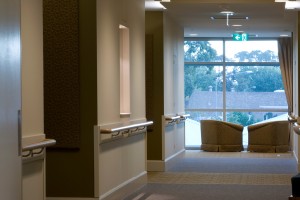
Goodwin Aged Care Services is concerned by the announcement of $1.2 billion in cuts to one of Australia’s highest-growth industries, which is in dire need of jobs and growth.
“Sustainability, and workforce attraction and retention are crucial for the aged care industry to be able to meet the needs of Australia’s most frail people, now and into the future,” said Goodwin Chief Executive Officer, Sue Levy.
The statistics are clear: the number of people aged between 65 and 84 is projected to rise from 3.1 million in 2015 to 7 million by 2054. 40,000 people will be over 100 years old.
Cuts are primarily to the Aged Care Funding Instrument (ACFI), which sets core funding for residential aged care. Current funding to aged care providers is provided in three streams: behavioural assistance, physical assistance and complex care needs.
“Complex Health Care ACFI claims are increasing beyond Government forecasts as the number of people with high care needs continues to grow. The complex care category funding has grown disproportionately to the other two”, Ms Levy said.
To avoid a projected blowout, the Government will reduce indexation of the Complex Health Care component of the ACFI by 50 per cent in 2016‑17.
“We recognise that as Australia’s population ages, the Government needs to ensure its aged care funding is sustainable. However, in changing the structure of the funding model, the Government needs to be careful not to inhibit the ability of providers to deliver high quality aged care,” Ms Levy said.
“We encourage the government to focus on reviewing an evidently flawed funding system over alarming, blanket cuts to core funding.”
Industry raised these same concerns in 2015, when $472 million in cuts to ACFI subsidies were announced in the Mid-Year Economic and Fiscal Outlook (MYEFO) yet we now see larger, and broader cuts to the same system.
A reduction in funding compromises providers’ ability to support its workforce, as well as its consumers, said Ms Levy. Funding directly impacts how a provider rosters its staff.
“The aged care industry already suffers from a highly mobile workforce. We need to retain good employees at the same time as to continue to grow our workforce as consumer demand increases with population ageing,” said Ms Levy.
The government also needs to review forecasting, to clarify the true costs of providing complex care. More people are coming into residential care at more advanced stages of need than ever before. This includes a large number of people living with dementia.
Dementia is the second leading cause of death and is projected to affect almost 1 million people by 2050. We are disappointed by the lack of any address in the Budget for funding dementia care.
Goodwin welcomes the government’s commitment to redirect the $1.2 billion saving to fund “other health policy priorities”, and would like to see the saving redirected back into aged care, in particular dementia care and employment development strategies.
We believe that the government should view aged care as a health priority in this country.
Provision of affordable housing for older people also needs to be a priority.
“Current federal budget discussion is focussed on funding issues around residential care, but the majority of older people desire to maintain autonomy, independence and community connections for as long as possible. They are living in their own homes, or downsizing to more suitable independent living”, said Ms Levy.
“Pensioners and the asset-poor face immediate challenges of limited affordable options for secure accommodation when they are at an extremely vulnerable stage of life.”